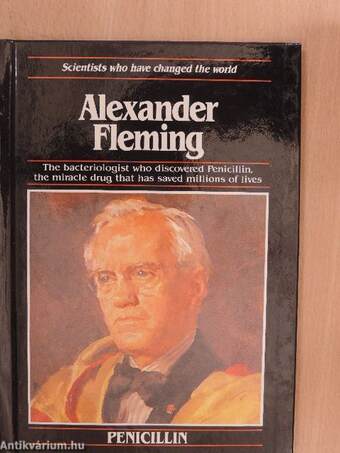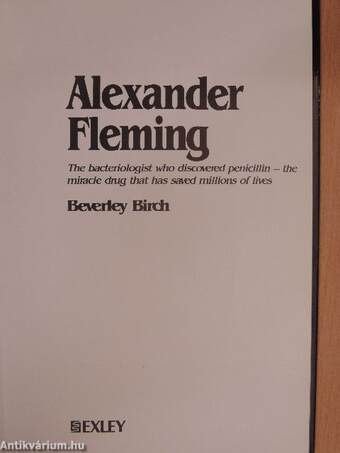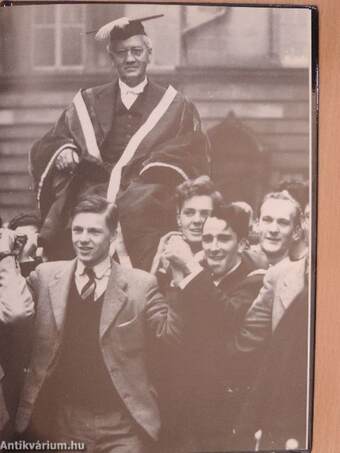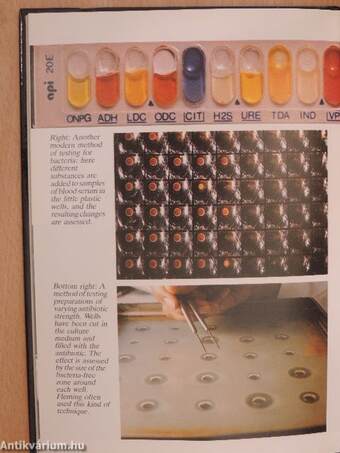1.066.452
kiadvánnyal nyújtjuk Magyarország legnagyobb antikvár könyv-kínálatát

VISSZA
A TETEJÉRE
JAVASLATOKÉszre-
vételek
Alexander Fleming
The bacteriologist who discovered penicillin - the miracle drug that has saved millions of lives
| Kiadó: | Exley Publications Ltd. |
|---|---|
| Kiadás helye: | Watford |
| Kiadás éve: | |
| Kötés típusa: | Fűzött kemény papírkötés |
| Oldalszám: | 64 oldal |
| Sorozatcím: | Scientists who have changed the world |
| Kötetszám: | |
| Nyelv: | Angol |
| Méret: | 21 cm x 15 cm |
| ISBN: | |
| Megjegyzés: | Fekete-fehér és színes fotókkal. |
naponta értesítjük a beérkező friss
kiadványokról
naponta értesítjük a beérkező friss
kiadványokról
Előszó
The case of Harry Lambert
The man was plainly dying. For more than six weeks they had been fighting to save him. But now his temperature soared. He tossed and mumbled in the throes of a vicious... Tovább
Előszó
The case of Harry Lambert
The man was plainly dying. For more than six weeks they had been fighting to save him. But now his temperature soared. He tossed and mumbled in the throes of a vicious fever, wracked by agonizing spasms and uncontrollable hiccups. And then from time to time he was drowsy, falling into a coma.
To Alexander Fleming, standing by his bedside, there was no doubt that Harry Lambert had little time to live.
He, like the other doctors in St. Mary's Hospital, London, knew what was wrong with Lambert. Microbes - microscopic living organisms - had invaded his body. Diseases like this were usually caused by some form of microbe taking over and weakening or poisoning a person's body, sometimes to the point of death.
They had tried to treat him with the only drugs they had. He had simply become much worse.
And all the time Alexander Fleming had been trying to track down the microbe. Without knowing which it was, the doctors could not hope to save Lambert's life. And so in his laboratory Fleming had worked on determinedly.
At first Lambert had seemed to be suffering from a kind of influenza. But as his condition deteriorated, all the terrible signs of the disease known as meningitis began to show themselves. And meningitis, an infection of the waterproof sheath of membranes that surround the brain and spinal cord, was too often fatal.
Using a hollow needle and a syringe, Fleming drew off some of the watery fluid surrounding Lambert's spinal cord. If he had meningitis, then the microbe must show itself in that spinal fluid.
And this time Fleming saw it. It was one of the round microbes, which grow in chains, called a streptococcus, virulent, fast-spreading, and often Vissza
Fülszöveg
Scientists who have chanaed t le worfd
Many doctors believe that the discovery and development of penicillin was the greatest single medical advance the world has ever known. Before penicillin, less than fifty years ago, anyone might have died from a common, easily caught infection raging out of control.
Hospitals were full of people suffering from dangerous infections caused by microbes rampaging through their bodies unhindered. Women died in childbirth, babies died after birth. Children died from scarlet fever, from infections of bones, throat, stomach, brain, boils, skin infections, even a splinter or tiny cut might become a killer.
Yet many doctors working nowadays have never seen this kind of disease - it is now a thing of the past and we owe that to the dawn of the antibiotic age - the era of medical dnigs using one microbe to kill another.
This is the exciting story of the man, Alexander Fleming, whose brilliant discovery of a chance mould growing in his lab. brought... Tovább
Fülszöveg
Scientists who have chanaed t le worfd
Many doctors believe that the discovery and development of penicillin was the greatest single medical advance the world has ever known. Before penicillin, less than fifty years ago, anyone might have died from a common, easily caught infection raging out of control.
Hospitals were full of people suffering from dangerous infections caused by microbes rampaging through their bodies unhindered. Women died in childbirth, babies died after birth. Children died from scarlet fever, from infections of bones, throat, stomach, brain, boils, skin infections, even a splinter or tiny cut might become a killer.
Yet many doctors working nowadays have never seen this kind of disease - it is now a thing of the past and we owe that to the dawn of the antibiotic age - the era of medical dnigs using one microbe to kill another.
This is the exciting story of the man, Alexander Fleming, whose brilliant discovery of a chance mould growing in his lab. brought about this new era. He alone discovered the first - and still the best - antibiotic, penicillin. At the same time it is also the story of the Oxford team of scientists who took Flemings penicillin and transformed it from the raw juice of a mould into a medical drug. A medical drug which would save untold millions of lives. Vissza
Témakörök
- Életrajz > Tudomány > Tudósok
- Idegennyelv > Idegennyelvű könyvek > Angol > Természettudományok > Biológia
- Idegennyelv > Idegennyelvű könyvek > Angol > Orvostudomány
- Idegennyelv > Idegennyelvű könyvek > Angol > Életrajz > Tudomány > Tudósok
- Természettudomány > Biológia > Biológia, általános > Mikrobiológia > Baktériumok, vírusok
- Természettudomány > Biológia > Biológia, általános > Tudósok
- Természettudomány > Biológia > Biológia, általános > Idegennyelvű
- Orvostudomány > Gyógyszertan > Gyógyszerkészítmények > Antibiotikum
- Orvostudomány > Gyógyszertan > Idegennyelvű
- Orvostudomány > Gyógyszertan > Története
- Orvostudomány > Orvosi idegennyelvű könyvek > Gyógyszertan













